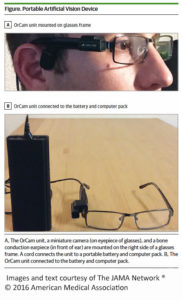 A miniature camera using optical character-recognition technology, mounted onto the eyeglasses of people who are considered legally blind, dramatically improves their ability to read an email, newspaper article, menu or page in a book, a study by researchers with UC Davis Health System has found.
A miniature camera using optical character-recognition technology, mounted onto the eyeglasses of people who are considered legally blind, dramatically improves their ability to read an email, newspaper article, menu or page in a book, a study by researchers with UC Davis Health System has found.
Using the device, the study participants were significantly better able to perform activities of daily living. The device recognizes text and reads it to the user using an earpiece that conducts sound, and can also be programmed to recognize faces and commercial products.
The device offers new hope for the large and growing number of individuals with age-related macular degeneration or advanced-stage glaucoma, two of the leading causes of vision loss among the elderly in the United States, said Mark J. Mannis, professor and chair of the UC Davis Department of Ophthalmology & Vision Science.
The research, “Evaluation of a Portable Artificial Vision Device among Patients with Low Vision,” is published online today in JAMA Ophthalmology.
“Age-related macular degeneration is one of the most common causes of blindness in the elderly and it has no cure in its advanced stages,” said Mannis, Fosse Endowed Chair in Vision Science Research and the study’s co-author. “This device offers hope to patients who are beyond medical or surgical therapy for the condition.”
“It is easily used and could potentially bring greater independence, particularly for older patients who are struggling with vision loss,” Mannis said.
An estimated 1.8 million Americans 50 and older are affected by age-related macular degeneration, according to the U.S. Centers for Disease Control and Prevention. That number is estimated to reach approximately 3 million by 2020. Age-related macular degeneration is the leading cause of permanent impairment of reading and fine or close-up vision among people 65 and older.
Read More – Source: Device worn on eyeglasses offers hope for people with low vision